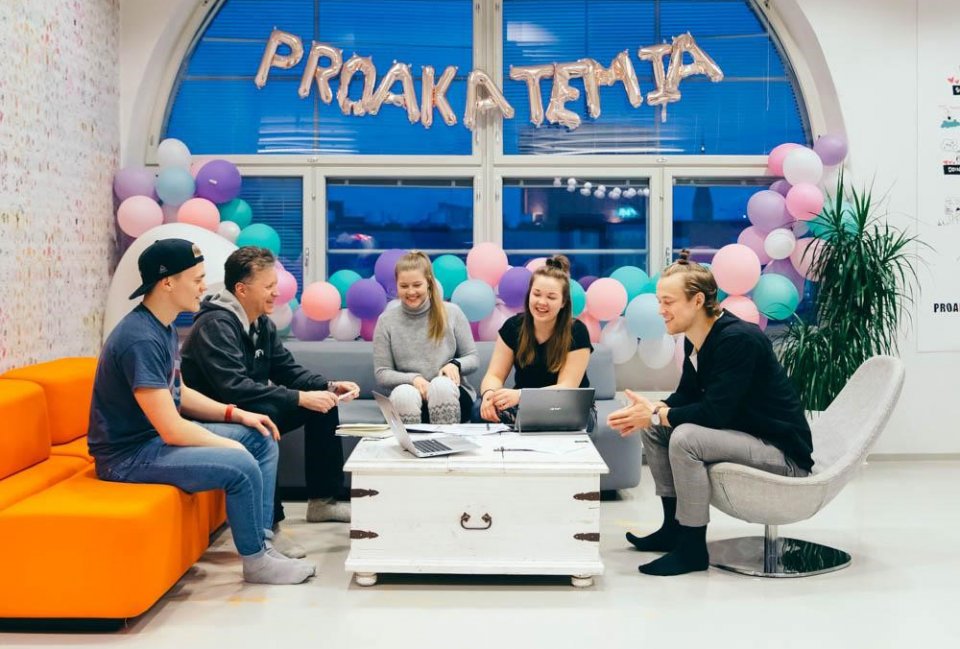
Proakatemia is an ecosystem of team learning at Tampere UAS. In Proakatemia, teams of 10–20 students establish a cooperative and learn entrepreneurship, team work and substance by implementing business projects. Business students apply for Proakatemia in the beginning of their studies. Physiotherapy and social services students can apply for this entrepreneurial study path and the well-being sector cooperative for the last 1.5 years of their studies. The students are selected on the basis of their applications and interviews.
In this article, I will look into the team model in the health care sector entrepreneurial studies. First, I describe the origins and background theories of the model. Then, I present the stories of two physiotherapy graduates from Proakatemia, based on their interviews. In the end, I will take a closer look at one ongoing project in the well-being sector and the thoughts of students who are about to graduate from Proakatemia.
Proakatemia’s background
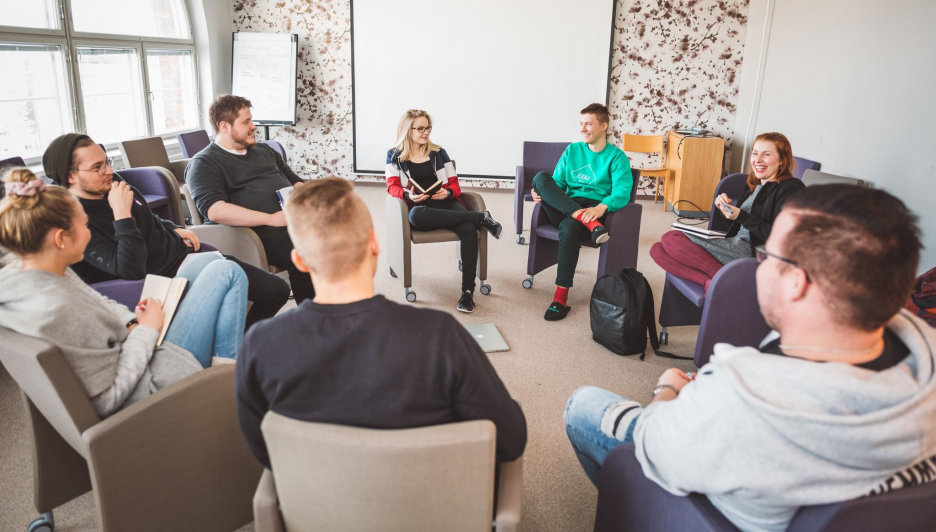
Aiming at dialogical debate is at the core of Proakatemia team learning. Dialogicality (Holma et al. 2018) requires mutual trust between team members and a genuine aspiration to understand other people’s views. In the dialogue, the participants do no try to defend their own views and win the argument but listen to and hear the other participants in an empathic way. Dialogue is investigative speech or discussion where different views are pondered within the team. Investigative dialogue (Hannula 2012, 33) is created by the feeling of safety of the participants and their courage to bring in semi-finished thoughts without the fear of being criticized or laughed at. Investigative dialogue develops and grows when the debate is being enriched by the participants continuing on each other’s views and expanding their own views in an encouraging atmosphere.
Dialogicality is a prerequisite for learning organisations. In 1990, Peter Senge suggested in his groundbreaking book The Fifth Discipline: The Art and Practice of the Learning Organization, there are five fundamental disciplines to success that also Proakatemia pursues: 1) systems thinking, which is the basis for all five disciplines and describes the ability to use connections between different elements; 2) personal mastery which means individuals’ aspiration to continuously develop themselves; 3) shared vision which is the team’s ability to create a shared and meaningful vision; 4) mental models which are abilities to recognise old habits and, whenever needed, step outside of them and 5) team learning which means the team’s potential to be more than the sum of its parts and by that being able to answer to growing global complexity. All five Senge’s fundamental disciplines require active dialogicality. (Fillion et al. 2015.)
Two stories of Proakatemia alumni entrepreneurs
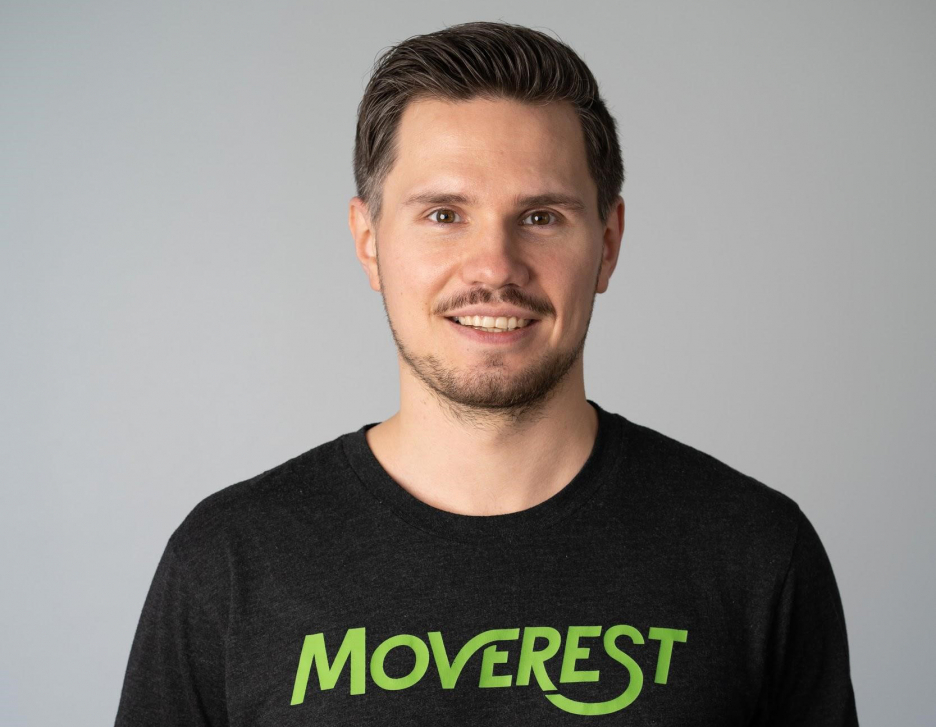
Proakatemia’s well-being teams have produced many sole traders in physiotherapy and two bigger companies employing several people: Proxima Finland and Moverest. Business planning for both of them started when their founders were still students. Proakatemia model enables and encourages students to continue with their learning projects so that they become their jobs after graduation. At best, working during studies does not mean a delay in graduation but a smooth transition into working life.
Joni Puhakkka, one of the founders of Moverest, and his business partner used the last semester of their studies for planning their limited liability company. Challenges included, among others, the requirement of an experienced, responsible physiotherapist in physiotherapy care centres and the separation of services with and without VAT. To sort out these, Puhakka used the Proakatemia premises for some time even after graduation (Puhakka 2020). Also the founder of Proxima Finland, Arttu Peltola, says that he encountered difficulties in the start-up phase of his company, due to permission applications and legal requirements of setting up health care sector companies, such as the need for hand washing facilities, sufficient ventilation and soundproofing in treatment locations. These have to be in place before any operations with customers may start. (Peltola 2020.)
To Moverest, Proakatemia model taught at least the following: basic understanding of business, dialogicality and workshop-based working model where business is developed together with colleagues by team learning methods. Also, the organisation of Moverest has remained flat and equal as it is in Proakatemia teams. Proakatemia has taught how important it is to listen to your colleagues and respect differences. Joni Puhakka says that he now understands his own limitations and believes that the fundamental disciplines of learning organisations also support Moverest’s operations. Joni wants to regularly listen to his team members, both individually and as a team. While studying in Proakatemia Joni thought that he found meaningful projects within his team but, on the other hand, got too emotional at times. (Puhakka 2020.)
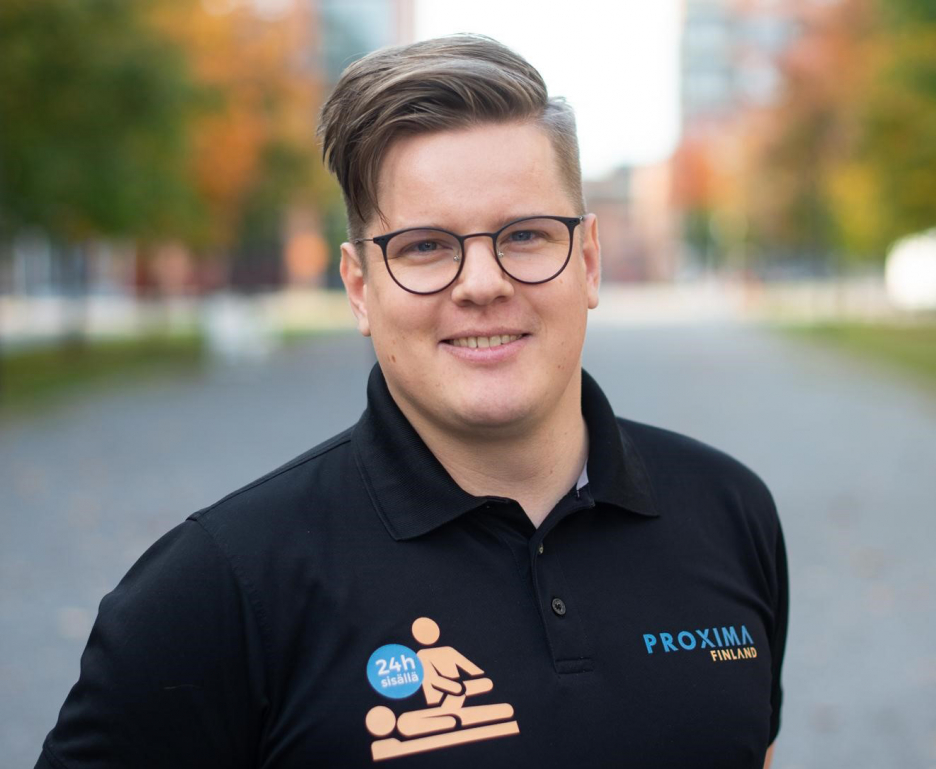
Arttu Peltola of Proxima Finland mainly agrees with Joni: when Proakatemia starts, students may rush into different projects without really thinking the objectives and resources of their participation. On the other hand, it is safe to try different projects in Proakatemia and failing is not considered bad. This is good when you’re looking for your own way. Arttu also says that team learning and dialogicality have been taken into use in the company, as they were used in Proakatemia. Due to different, mutually enriching views, a team may produce more than the sum of its parts. Thanks to casting skills learned in Proakatemia, it is now easier to benefit from complementing skills of different individuals in, let’s say, marketing. Also regular writing is something that students learn in Proakatemia: instead of exams, they write essays to pass their courses. In Proxima Finland, the staff publish blogposts and podcasts on health-related topics that attracts new customers for the company. (Peltola 2020.)
What is going on in Proakatemia well-being team right now?
The cooperative founded by Proakatemia well-being team is called Motive. In spring 2020, Motive developed a product named Kuntoakatemia (“Fitness Academy”), together with the business team Evision and its network specialists. Kuntoakatemia’s business idea is to offer online fitness coaching at three different intensity levels (Kuntoakatemia n.d.). In practice, Motive cooperative members planned the training videos and Evision network specialists did the technical part of the project. Motive took its business idea to Proakatemia Pitching Contest where products were selected to the autumn sales contest (Mali 2020a). Kuntoakatemia’s online coaching reached its targets and, for the first time, the well-being team’s product was selected for sales, thus winning the teams specialising in business. Later, in the autumn sales contest, Motive team members hit the team’s record and sold online coaching for over 10,000 euros.
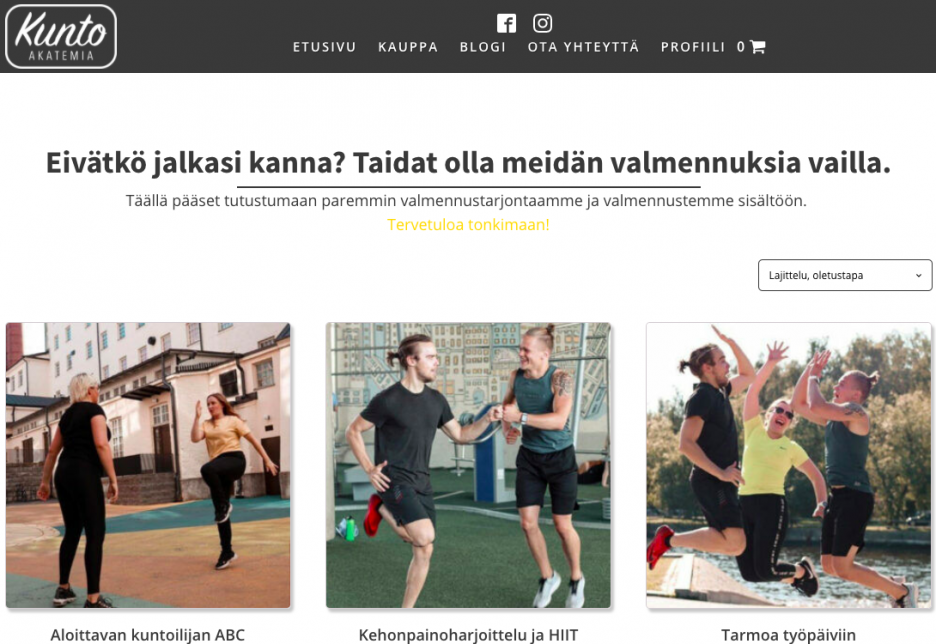
Concluding remarks
When I read the well-being team students’ descriptions of their experiences in Proakatemia just before their graduation, I can’t stop thinking of a rollercoaster: sometimes we hit very high and sometimes we were very deep down (e.g. Mali 2020b; Korhonen 2020). You could imagine that freedom to plan one’s own studies would lead to easy solutions. However, it’s the other way around: the sense of responsibility of self-directed students, and the amount of work they do, easily exceed the minimum requirements. On the other hand, the complex world offers unlimited opportunities which makes it difficult to plan and coordinate shared vision and personal mastery. Trials and finetuning all the Senge principles (Fillion et al. 2015) may take more than 1.5 years of the team. Also achieving dialogicality takes time, and this spring’s pandemic-imposed distance learning posed particular challenges to emphatic listening.
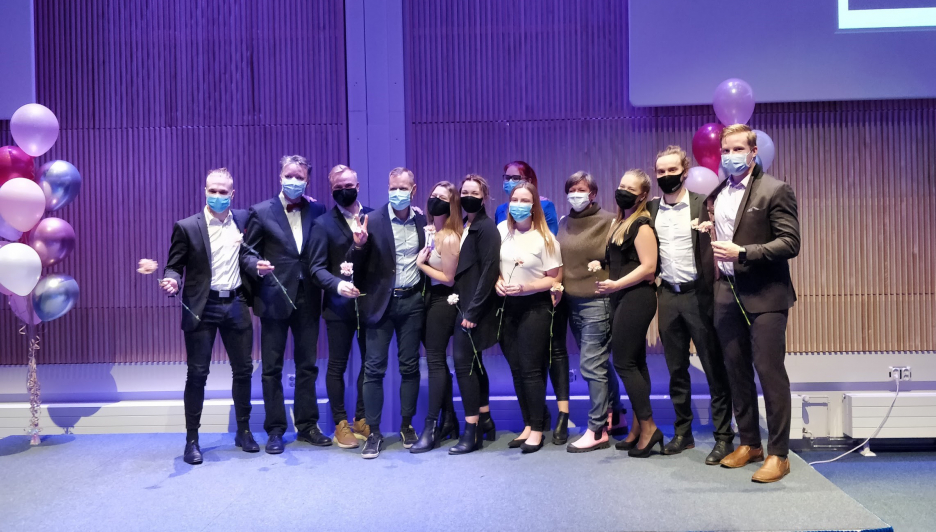
Part of the team wished to have clearer leadership and framework for studies. As a new coach, I often thought about the best way to help my team. Too much guidance kills the swarm intelligence and blocks boldness in trials. On the other hand, too little guidance may lead to dissolution. Luckily, Proakatemia also has the student team steering all activities and the team of coaches, and these two teams are always willing to help both the students and the coaches. This is team learning.
As one of our graduating student says:
“It may be that the experiences I had in Proakatemia only bear fruit in the future. Making your own schedules, creating a livelihood out of almost nothing and taking care of yourself and other team members requires a lot of work and understanding of oneself and others. I wish that everything I’ve learned helps me be a better employee, manager or entrepreneur in the future.” (Korhonen 2020.)
Sources
Fillion G, Koffi V & Ekionea J-PB 2015. Peter Senge’s learning organization: a critical view and the addition of some new concepts to actualize theory and practice. Journal of Organizational Culture, Communications and Conflict 19(3): 73–102.
Hannula M 2012. Seeking Dialogue Classroom Discussions in Small Groups. Dissertation. Jyväskylä University.
The following sources are only in Finnish:
Holm R, Poutanen P & Ståhle P 2018. What makes a dialogue - features and prerequisites of dialogical interaction. Sitra.
Kuntoakatemia n.d.
Korhonen O-P 2020. My experiences of studying in Proakatemia.
Mali I 2020a. Kuntoakatemia to sales contest 2020 – how did we build a winning pitch?
Mali I 2020b. I am now a physiotherapist - and a lot more
Peltola A 2020. Proxima Finland Oy. Personal interview on Proakatemia team learning model in physiotherapy entrepreneurship.
Puhakka J 2020. Moverest Oy. Personal interview on Proakatemia team learning model in physiotherapy entrepreneurship.
Tiimiakatemia n.d.
WritersIlkka Piiroinen, coach / Proakatemia, lecturer / Tampere UAS Well-Being and Health Technology
Related content
Liini markkinointi ja idean pitchaus
Liini ajattelu jäsentää liiketoimintaa koko skaalalla liiketoimintamalleista yrityksen markkinointiin. Design Sprint on yksi työkalu, jonka avulla voi kehittää yrityksen...
Check it outAsiakasymmärryksestä arvon luomiseen
Kuinka ideasta voi tehdä kaupallisen tuotteen. Kuinka kehittää tuote, jolla on myös kysyntää? Kuinka luoda asiakkaalle arvoa, josta hän on myös valmis maksamaan?
Check it outLiikeidea kirkkaaksi
Idea on alku kehittämiselle ja innostukselle. Se voi johtaa yrityksen perustamiseen tai olemassa olevan toiminnan laajentumiseen, uuteen liiketoimintamalliin,...
Check it out


